|
|
|
Sort Order |
|
|
|
Items / Page
|
|
|
|
|
|
|
| Srl | Item |
| 1 |
ID:
131415
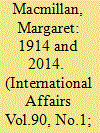

|
|
|
|
|
| Publication |
2014.
|
| Summary/Abstract |
The outbreak of the First World War remains a great historical puzzle and a source of concern, for if we do not understand how it came about we run the risk of stumbling into a similar catastrophe. This article draws parallels between the world of 1914 and the present. It starts with comfortable assumptions made by so many, then and now, that a major conflict was impossible or improbable and then looks at the paradox that globalization not only made the world more interdependent and linked, but also fostered intense local and national identities. It suggests factors that propelled Europe to war in 1914, including national rivalries, imperialism, the arms race and a shifting power balance between rising and declining powers, as well as ideologies and assumptions such as Social Darwinism and militarism, and points out that similar forces and ideas are present today. The article also stresses the dangerous complacency that can arise as a result of decision-makers having successfully dealt with a series of crises. European decision-makers also assumed that they could successfully use war as an instrument of policy and largely ignored or explained away the mounting evidence that the advantage in conflict was swinging to the defence. Again, as the author points out, there are disquieting parallels with the present.
|
|
|
|
|
|
|
|
|
|
|
|
|
|
|
|
| 2 |
ID:
117411
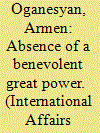

|
|
|
|
|
| Publication |
2012.
|
| Summary/Abstract |
AMERICAN AUTHOR Anne O'Hare McCormick (1880-1954), whose life experience was interwoven with both world wars, packaged into a single phrase the lessons to be derived from the tumultuous epochs when she famously wrote: "Today the real test of power is not capacity to make war but the capacity to prevent it."
|
|
|
|
|
|
|
|
|
|
|
|
|
|
|
|
| 3 |
ID:
108107
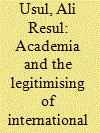

|
|
|
|
|
| Publication |
2011.
|
| Summary/Abstract |
This article aims to highlight the connection between academic studies and international politics and to provide an academic justification of foreign policies with particular reference to the case of democratisation studies. It embodies a two-way relationship. On the one hand, the conjunctures of international politics influence the nature of academic studies in the discipline of Political Science; on the other hand, academic studies may sometimes be employed as sources of legitimisation of the foreign policies of states. The article discusses these connections, providing particular examples of academic studies of the democratisation process during the Cold War and the post-cold war era.
|
|
|
|
|
|
|
|
|
|
|
|
|
|
|
|
| 4 |
ID:
093888


|
|
|
|
|
| Publication |
2010.
|
| Summary/Abstract |
Conflict prevention, more than other fields of international politics and foreign policy, is characterized by a multiplicity of state and non-state actors, giving rise to particularly complex coordination challenges. This article evaluates the extent to which the German response to these challenges, the action plan for civilian conflict prevention, has succeeded in its aim of improving coordination to increase policy coherence between different governmental agencies as well as with civil society actors. It finds that although the general approach is indeed promising, the government's lack of commitment prevents it from tapping into the action plan's full potential.
|
|
|
|
|
|
|
|
|
|
|
|
|
|
|
|
| 5 |
ID:
131763
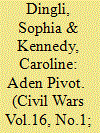

|
|
|
|
|
| Publication |
2014.
|
| Summary/Abstract |
This article argues that the Aden Insurgency was a pivotal moment in the history of British counter-insurgency. We argue that it was in Aden where the newfound strength of human rights discourse, embodied in Amnesty International, and of anti-colonial sentiment, expressed by the UN General Assembly, forced the British government to pay attention to public perceptions of colonial brutality. Using archival sources, we foreground three episodes in the history of the insurgency to support our argument and to illustrate that the changes witnessed were not the result of 'learning' but of a fundamental shift in the international environment.
|
|
|
|
|
|
|
|
|
|
|
|
|
|
|
|
| 6 |
ID:
163995
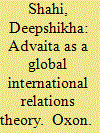

|
|
|
|
|
| Publication |
Oxon, Routledge, 2019.
|
| Description |
ix, 170p.hbk
|
| Series |
Rethinking Asia and International Relations
|
| Standard Number |
9781138497740
|
|
|
|
|
|
|
|
|
|
|
|
Copies: C:1/I:0,R:0,Q:0
Circulation
| Accession# | Call# | Current Location | Status | Policy | Location |
| 059594 | 327.101/SHA 059594 | Main | On Shelf | General | |
|
|
|
|
| 7 |
ID:
092173
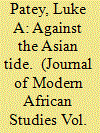

|
|
|
|
|
| Publication |
2009.
|
| Summary/Abstract |
The efforts of American activists to pressure Asian corporations in Sudan have to date resembled a struggle to find the light switch in the dark, or swimming against a strong current. While the impact of the divestment campaign in the United States has been increasingly evident, its effectiveness in producing actual results in Sudan remains suspect. Thanks to China and a trio of Asian national oil companies, oil still flows in Sudan. The campaign's activities have failed to incorporate Sudan's wider international political and economic relations into its strategy. It has rather paradoxically sought to pressure state-owned corporations through financial market divestment. The nature of its Asian targets, reluctant Western investors and a distracted American government have obstructed the campaign from having a resounding impact in Sudan.
|
|
|
|
|
|
|
|
|
|
|
|
|
|
|
|
| 8 |
ID:
134097
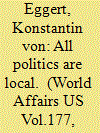

|
|
|
|
|
| Publication |
2014.
|
| Summary/Abstract |
Let us drink to Putin! He is doing so many good things for us." This toast from a friend's mother, at a recent friendly gathering of neighbors at my dacha near Moscow, made a few of us around the table feel a little uneasy. I think it was the first time that I'd heard someone proposing to drink the health of one of our heads of state when it wasn't required by protocol. However, this lady's emotions were sincere and, given the circumstances in Russia today, quite logical. Vladimir Putin's Crimean blitz was a very domestic Russian affair, designed to give the people a new sense of imperial pride and, by extension, provide the Kremlin with a badly needed popularity boost. In this regard, it succeeded beyond expectation. Even the tragedy of Malaysia Airlines Flight 17 did not shake the foundations of the conviction that most Russians hold: their country is a beacon of moral fortitude and spiritual greatness besieged by the Western forces of atheism, permissiveness, and greed.
|
|
|
|
|
|
|
|
|
|
|
|
|
|
|
|
| 9 |
ID:
139496
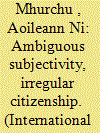

|
|
|
|
|
| Summary/Abstract |
This paper reflects on the recent development of new and innovative ways of thinking about political subjectivity in international politics as flexible and contingent by specifically considering ambiguity (in-between-ness) as an important, yet under-theorized, aspect of how political subjectivity is experienced. It does so by focusing on the question of irregular citizenship, where people get caught between citizenship and migration. Focusing on the constant question mark around citizenship and around the alternative of being a migrant in the everyday life of certain people in the United States and in Europe, this paper unpacks how ambiguity is constitutive of political identity and belonging. It argues that Julia Kristeva's notion of “foreignness” offers a useful way of understanding experiences of being political which escape both citizenship and migration and are instead embodied in stylistic emotions (for example, poetry, friendship, family ties).
|
|
|
|
|
|
|
|
|
|
|
|
|
|
|
|
| 10 |
ID:
086440
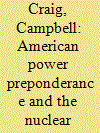

|
|
|
|
|
| Publication |
2009.
|
| Summary/Abstract |
The theory of Power Preponderance put forward by Stephen Brooks and William Wohlforth is poised to replace structural balance-of-power theory as the leading American Realist interpretation of international politics. Power Preponderance argues that would-be rivals to the US are not balancing against it because they are dissuaded from doing so by geopolitical and structural factors, rather than because they love the US or are cowed by it. This article shows why the central analytical claim of Power Preponderance would be substantially enhanced by incorporating the logic of the nuclear revolution, but that its main policy recommendation - indefinite and magnanimous American preponderance - is undermined by the spectre of nuclear war. In the nuclear age, normative solutions to the problem of anarchy invariably gravitate toward the logic of a world state.
|
|
|
|
|
|
|
|
|
|
|
|
|
|
|
|
| 11 |
ID:
006570
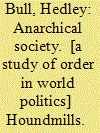

|
|
|
|
|
| Publication |
Houndmills, Macmillan, 1995.
|
| Description |
xviii, 329p.
|
| Standard Number |
0333638212
|
|
|
|
|
|
|
|
|
|
|
|
Copies: C:1/I:0,R:0,Q:0
Circulation
| Accession# | Call# | Current Location | Status | Policy | Location |
| 038319 | 327.1/BUL 038319 | Main | Withdrawn | General | |
|
|
|
|
| 12 |
ID:
123018
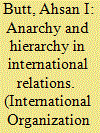

|
|
|
|
|
| Publication |
2013.
|
| Summary/Abstract |
This article questions the validity of anarchy as an assumption in International Relations theory. Powerful states often provide public goods to smaller states in return for their acquiescence on matters of interest. This transactional provision of public goods is analogous to how central governments behave in domestic environments; thus the hierarchic structure of domestic politics is replicated in international politics. The anarchy-hierarchy distinction, which rests on a neat separation of international and domestic structures, is therefore highly contentious. One public good that great powers provide, largely ignored by the literature on hierarchy, is justice. Powerful states can provide a forum for aggrieved parties to settle their disputes, and thus contain conflicts before they escalate to war. If such a forum is no longer provided, the system reverts to anarchy, where escalation-and therefore, war-is more likely. South America's war-prone decade can be explained by the variation in structural conditions on the continent. Due to the Depression, its Good Neighbor policy, and the onset of World War II, the United States was less interested in South American affairs in the 1930s, resulting in a more anarchic structure and a higher propensity for war.
|
|
|
|
|
|
|
|
|
|
|
|
|
|
|
|
| 13 |
ID:
091377
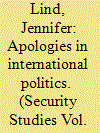

|
|
|
|
|
| Publication |
2009.
|
| Summary/Abstract |
This article examines the growing conventional wisdom that apologies and other acts of contrition are necessary for international reconciliation. I create and test a theory that connects a country's remembrance with that country's image-threatening or benign-in the eyes of former adversaries. I evaluate the theory in two post-World War II case studies: South Korean relations with Japan and French relations with Germany.
This article offers three major findings. First, it substantiates the claim that denials inhibit reconciliation. Japanese denials and history textbook omissions have elevated distrust and fear among Koreans (as well as Chinese and Australians). Second, although whitewashing and denials are indeed pernicious, the conventional wisdom about the healing power of contrition must be seriously reconsidered. Evidence from the Japanese and other cases suggests that contrition risks triggering a domestic backlash, which alarms former adversaries. Finally, there is good news for the prospects of international reconciliation: countries have reconciled quite successfully without any contrition at all. West Germany actually offered very little contrition at the time of its dramatic reconciliation with France; many other countries have restored close and productive relations without contrition. The best course for reconciliation is to remember the past in ways that are unifying, rather than divisive, and minimize the risk of backlash.
|
|
|
|
|
|
|
|
|
|
|
|
|
|
|
|
| 14 |
ID:
091791
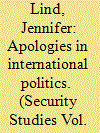

|
|
|
|
|
| Publication |
2009.
|
| Summary/Abstract |
This article examines the growing conventional wisdom that apologies and other acts of contrition are necessary for international reconciliation. I create and test a theory that connects a country's remembrance with that country's image-threatening or benign-in the eyes of former adversaries. I evaluate the theory in two post-World War II case studies: South Korean relations with Japan and French relations with Germany.
This article offers three major findings. First, it substantiates the claim that denials inhibit reconciliation. Japanese denials and history textbook omissions have elevated distrust and fear among Koreans (as well as Chinese and Australians). Second, although whitewashing and denials are indeed pernicious, the conventional wisdom about the healing power of contrition must be seriously reconsidered. Evidence from the Japanese and other cases suggests that contrition risks triggering a domestic backlash, which alarms former adversaries. Finally, there is good news for the prospects of international reconciliation: countries have reconciled quite successfully without any contrition at all. West Germany actually offered very little contrition at the time of its dramatic reconciliation with France; many other countries have restored close and productive relations without contrition. The best course for reconciliation is to remember the past in ways that are unifying, rather than divisive, and minimize the risk of backlash.
|
|
|
|
|
|
|
|
|
|
|
|
|
|
|
|
| 15 |
ID:
107065
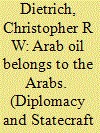

|
|
|
|
|
| Publication |
2011.
|
| Summary/Abstract |
Drawing from material in American and British national archives, the Johnson and Nixon presidential libraries, the archives of the International Monetary Fund, and the United Nations record, this article examines the international politics surrounding the June 1972 nationalisation of the Iraq Petroleum Company. The response to the nationalisation reveals a complex relationship between traditional Cold War concerns and the emergence of a Third World challenge to the structure of the post-war international economy: the practice of raw material sovereignty. Although Soviet aid to the Ba'ath government was central to nationalisation, it was far from exclusive. Accordingly, the nationalisation illustrates the dynamism of the Cold War era and places on display important forces that operated independently of Cold War constraints.
|
|
|
|
|
|
|
|
|
|
|
|
|
|
|
|
| 16 |
ID:
146710
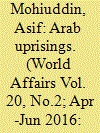

|
|
|
|
|
| Contents |
This article points out that the watershed events that initiated the period of contentious politics in the Arab world after 2010 not only reshaped regional and global politics but also challenged state power and long held theories dominant in the region, particularly about the popular acquiescence to regime control. They opened new areas of inquiry as well. By their impact on regional and international politics, these events have drawn the attention of scholars across the world. Some argue that these changes occurred as a result of the globalisation of democratic norms, new media technologies and regional structural changes, which led to widespread demonstrations, both violent and nonviolent. In calling for the downfall of the entrenched regimes, they signalled a breakdown of the social contract that had existed between the people and their rulers since independence.
|
|
|
|
|
|
|
|
|
|
|
|
|
|
|
|
| 17 |
ID:
125125
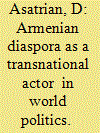

|
|
|
|
|
| Publication |
2013.
|
| Summary/Abstract |
IT IS CUSTOMARY to recognize sovereign states and the interstate organizations established on their basis as the leading actors in the political system of the contemporary world. Such theoretical schools as realism and, with some differences, constructivism support this approach.
|
|
|
|
|
|
|
|
|
|
|
|
|
|
|
|
| 18 |
ID:
102419
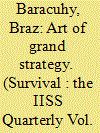

|
|
|
|
|
| Publication |
2011.
|
| Summary/Abstract |
It seems almost paradoxical that the study of 'grand strategy', broadly understood as the international vision pursued by the foreign policy of a state, has been to a large extent neglected by international-relations scholars. This lack of attention to a concept that is nearly intuitive to diplomatic practice says much about how International Relations (the field of study) became divorced from international relations (the real world of 'politics among nations', to borrow Hans Morgenthau's formulation). As the field moved away from its classical roots, international-relations theorists became obsessed with modelling politics after the natural sciences. The application of an economics paradigm to international politics saw states rendered as rational actors that maximise goals and respond to structural stimuli just as companies do in the market. Positional analysis became more important than strategic conception.
|
|
|
|
|
|
|
|
|
|
|
|
|
|
|
|
| 19 |
ID:
134047
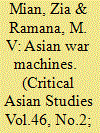

|
|
|
|
|
| Publication |
2014.
|
| Summary/Abstract |
The South Asian security landscape is increasingly dominated by a complex four-way dynamic between India, Pakistan, China, and the United States. The stresses and strains of the relationships between these states directly affect the prospects for peace and prosperity for almost half of humanity. This article describes some of the military contours of this landscape, with a focus on strategic postures, weapon acquisitions, and the role of nuclear weapons. It maps the India-Pakistan arms race over the past decade, the economic constraints on the two states, the role of China and the United States as weapons suppliers, and the risk and consequences for nuclear war. The authors then look at India's relationship with China, which is marked by both cooperation and competition, and the rise of China as a close military, political, and economic ally of Pakistan. While the United States has had long-standing cooperative relationships with both India and Pakistan, these relationships have been undergoing major shifts over the last two decades. U.S. concerns about China's increasing military and economic power have also intensified over this period as well. Of particular significance has been the effort to create a U.S.-India strategic partnership to balance and contain a rising China, which may become a central feature of the emerging global order. This article also offers a brief overview of what is publicly known about the nuclear arsenals of the four countries, ongoing production of weapons-usable fissile materials in Pakistan and India, as well as the race to build longer-range missiles.
|
|
|
|
|
|
|
|
|
|
|
|
|
|
|
|
| 20 |
ID:
124424


|
|
|
|
|
| Publication |
2013.
|
| Summary/Abstract |
Indigenous peoples are often perceived as custodians of nature owing to their close relationship with their environment and their nature-based livelihoods. This paper investigates the kinds of environmental agencies that are constructed for, and by, indigenous peoples within the United Nations (UN) Permanent Forum on Indigenous Issues (PF) and the Arctic Council. The particular focus of this research is the issue of responsibility. The article brings together empirical materials from the two forums and engages with them using Foucault-inspired approaches. We offer a critical discussion of indigenous peoples' environmental agency in international politics, addressing the need to problematize representations of indigenous agency that to date have been largely unchallenged in both the practice and study of international politics. We identify three perspectives through which the environmental agency of indigenous peoples is validated and justified: having particular knowledge, being stakeholders, and having a close relationship with nature. Certain kinds of expectations are inscribed in each of these perspectives; responsibility becomes intertwined with agency.
|
|
|
|
|
|
|
|
|
|
|
|
|
|
|
|
|
|
|
|
|